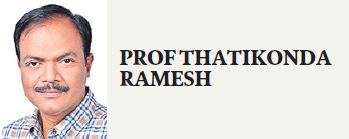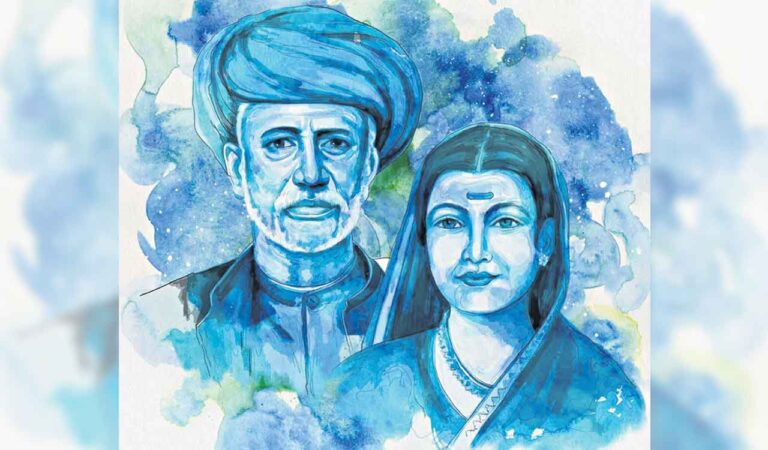Jyotiba Phule’s mission started in the 19th century but remains unfinished as caste class conflicts continue.
Posted Date – Monday, 11/28/22 at 12:50pm

Professor Thatikonda Ramesh
Hyderabad: The evolution of human beings from the primitive stage to the modern civilized society is mainly due to education. Mahatma Jyotiba Phule was well aware of the potential of education, its shaping and catalytic role in human development. He was the first great social visionary who realized that the foundation of modern India must overcome inequality and discrimination. Remarkably, Jyotiba Phule rationalized the roots of caste, gender and color discrimination more than 170 years ago and revealed their secrets. He was the first to influence social engineering by instilling awareness of social injustice in people and leading them to take action.
Educator-philosopher Paulo Freire mentioned that humans and animals live in society, but animals react impulsively, while humans respond temperately and rationally. Deliberate action relies on discretion. As humans, we must decide whether there is an artificial element to this discretion. If the reaction is guided by inhumanity, then there is no clear difference between man and animal.
Phule’s thoughts and actions are based on reason, balance and prudence. He rationally analyzes the struggles and upheavals in human history—between the practice of inequality and the desire for freedom and equality. He pleaded to lift restrictions on education, prepared an action-oriented agenda, and listed movements that could be put into action in a non-confrontational manner.
turning point
Although he interrupted his formal education, he did not stop reading. Jafar Baig Munshi and Lezet saw him immersed in his studies, explained the results of his formal studies to his father, Govindarao Phule, and then helped him enroll in the Scottish Missionary School.
A humiliating incident in the wedding procession of a Brahmin friend changes the course of Phule’s life. He has seen first-hand the stark social inequalities that are not just directed at individuals, but are affronts to entire communities. He believes it is time to abolish the corrosive, conservative caste system and its forms of discrimination. This is the starting point for intellectual agitation aimed at undoing the splintered social fabric. He believed that the most important issue to be addressed was social slavery rather than political oppression.
Drawing inspiration from Thomas Paine’s book, Rights of Men, he fostered ideals of truth, justice, and dharma. By 1847, he was familiar with the ideas of liberty, human rights, and equality. In this he was influenced by John Stuart Mill’s On Liberty. But he believes that a free government is not enough, a society built on non-discriminatory structures, regardless of caste and gender, and equal rights for all is the immediate need.
Education empowerment
Sudras were forced to voluntarily give up their dignity, self-respect and safety. Generally speaking, caste remains an obstacle to proper intellectual growth, personality development and unity of the people. Phule’s mission is to expose this hidden mechanism of oppression in upper caste communities.
Realizing that the backwardness of women, who make up nearly 50 percent of the population, was due to illiteracy, Phule educated his wife, Savitribai. He established a girls’ school on January 1, 1848. He opened an independent school for the Dalit community on 3 July 1851.
During 1851-59, he established not only schools for Dalit boys and girls but also shelters for orphans. Despite obstacles and insults created at every step by the powerful upper class and conservatives, he tolerated and overcome them, and continued his pursuit single-mindedly, without looking back.
Phules established a sanctuary for widows on January 28, 1853. By 1873, nearly 66 babies were born at home. Among them, the Jyotiba couple adopted a child named Yashwanth, who later became a doctor. During 1876-87, Maharashtra suffered the worst famine. Jyotiba and Savitribai procured grain and delivered kebabs to the shelters. During that difficult time of famine, they provided food for thousands of people.
miles to go
On November 28, 1890, Phule breathed his last. His main partner, Bhavkandaji Patel, told those gathered there: He wanted to shine a light into their lives. His vision and perspective, his words and deeds, his actions and activism are guided by them. His body may have left us, but he is immortal. His sacrifice was for the benefit of the most vulnerable in society. We may not be able to correctly evaluate his theoretical foundation and greatness, but his contribution will be recognized in the future, and his contribution will be remembered by history. We will continue his ideals and make his efforts bear fruit. “
Savitribai absorbed the spirit of these words. In 1896, the plague claimed thousands of lives even before people recovered from the effects of a severe famine. Savitribai came to rescue those suffering from deadly diseases. She provides medical assistance to a Dalit child in her arms. In the process, she fell ill with the plague and died on March 10, 1897. Dr. BR Ambedkar continues Phule’s unfinished agenda.
Even today, 75 years after gaining freedom, the agenda that Phule started in the 19th century remains incomplete. Today we find the same conflict between caste class inequality and equality aspirations and movements. There is a struggle for equality against sexism. It is hoped that Phule’s dream of a social organization free from inequality and discrimination will one day become a reality.

(Today is the 132nd anniversary of the death of Mahatma Jyotiba Phule, the author is the Vice Chancellor of Kakatiya University, Varangal)
